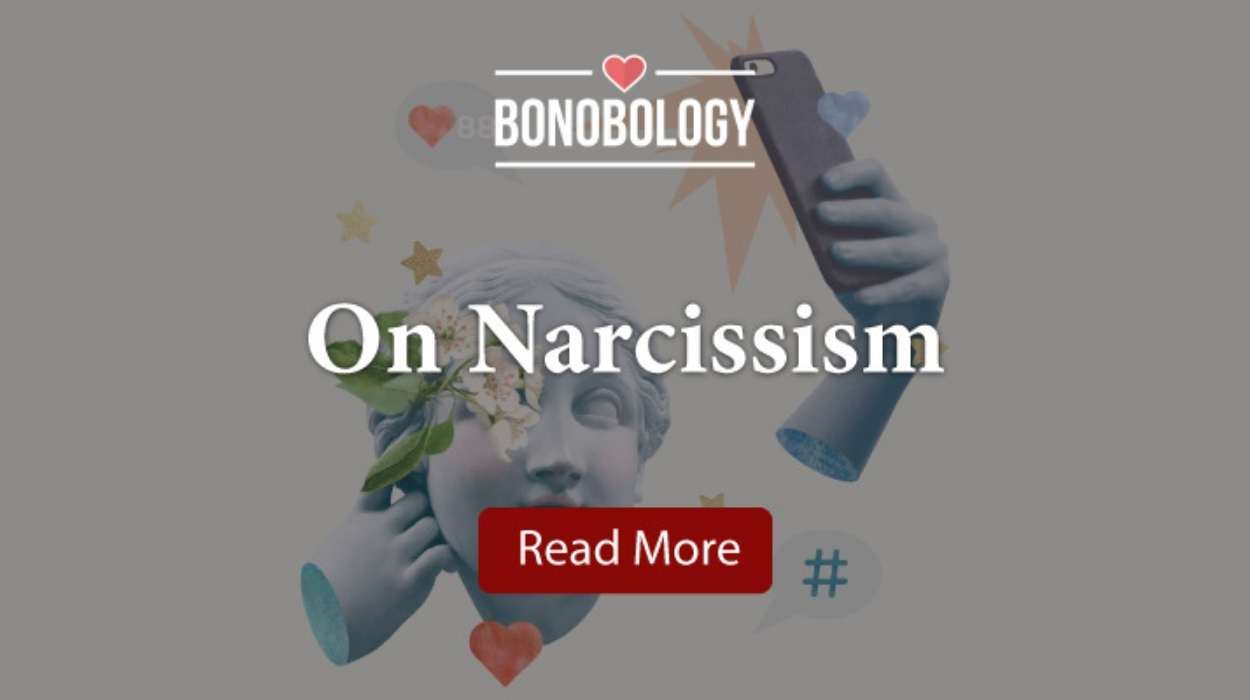21 Stages Of A Narcissistic Relationship With An Empath

“The narcissist is like a bucket with a hole in the bottom: No matter how much you put in, you can never fill it up,” said popular American psychologist and professor Dr. Ramani Durvasula. Of course, self-love should be an integral aspect of our lives. But when the cup of self-love overflows and narcissism starts hampering an individual’s relationships, it’s a dangerous place to be in. And what happens when a narcissist attracts an empath? Well, this article will delve deeper into the 21 Stages of a narcissistic relationship with an empath.
You might have guessed by now that such a relationship is bound to be one-sided. But what are the subtleties of such relationships and what can you expect in a toxic relationship such as this one in the long run? What are some signs a narcissist is using you? What happens when a narcissist meets his match? How long can a partner tolerate emotional abuse by a narcissist?
Let us help you explore the complex relationship dynamics between a narcissist and an empath with the help of our expert relationship counselor Ruchi Ruuh (Postgraduate Diploma in Counseling Psychology). We’re sure by the time you finish reading this article, you would’ve gained some valuable insights on such connections and have a clear idea about
when to step back. So, let’s get started.
What Happens When An Empath And A Narcissist Get Into A Relationship?
Before we get into the details of the stages of a narcissistic relationship with an empath, let’s look at the two terms ‘narcissist’ and ‘empath’ and find out how each differs from the other. Drawing from the Greek mythological character Narcissus, a hunter who fell in love with his own reflection in a pool as the result of a punishment, narcissism is a personality disorder that involves excessive self-importance, to the extent of being abnormally concerned about oneself.
Related Reading: How To Deal With A Manipulative Husband?
Empaths, on the other hand, are people who, by psychological terms, display hyperempathy, or excessive empathy for people around them. These highly sensitive people can care about others to the extent of ignoring their own needs and wants.
What’s the difference between a narcissist and an empath?
Interestingly, a narcissist’s psychological dynamics are so complicated that one can’t simply say they don’t possess empathy. In fact, a study once suggested that narcissists don’t simply lack empathy. Narcissists live with dysfunctional empathy that depends on various motivational and situational factors.
But it goes without saying that an empath and a narcissist are poles apart in terms of their needs and behavior. Ruchi explains, “An empath is a highly sensitive person who knows how to empathize and detect the feelings of other people.” Empaths possess qualities such as:
- Active listening skills
- Picking up on non-verbal cues
- Reading thoughts, feelings, and emotions
- Making people feel happy and comfortable around them, often at the cost of their own well-being
- Trying to find positive things among the chaos
Ruchi adds, “A narcissist, however, is someone who’s looking for someone with such skills.” Some narcissistic tendencies and traits are:
- Need for excessive love and affection
- Thirst for absolute control and power over other people
- Grandiosity, or an inflated sense of self
- Attention-seeking behavior
- Manipulative nature
- Inability to show empathy
Related Reading: 21 Toxic Girlfriend Signs Not Easy To Spot – It’s Her, Not You
“As we all know, opposites attract. So, since empaths don’t have healthy boundaries, people with narcissistic personality disorder love to penetrate those weak boundaries. The empath–narcissist pairing seems like an ideal couple, but such relationships are also full of manipulation and selfishness and soon become very toxic,” Ruchi says.
What are the features of a narcissist empath friendship or relationship?
Now that we know that empaths and narcissists are prone to be attracted to each other, let’s look at what happens when they get into a relationship. Well, it is common knowledge that a narcissist’s overpowering charisma and fake confidence attracts an empath like a magnet. But how do such relationships function over time? We’ll look at a few features of a relationship or friendship between a narcissist and an empath. Here they are:
● Narcissists control empaths: Empaths admire the charm and decisiveness of narcissists. In fact, a narcissist attracts an empath with a fake show of confidence.
● Narcissists put up a show of being ideal: In trying to showcase themselves as ideal wives, husbands, or partners, narcissists also sometimes mirror the empath’s qualities. An empath will thus feel they have found an ideal partner in a narcissist.
● It turns into a God–devotee relationship: Ruchi says, “A narcissist’s ego is like that of a movie star. Narcissists almost appear to be God-like figures to empaths, while empaths become their fans or devotees. While narcissists are constantly looking for validation, their fans (the empaths) are always encouraging and worshiping them like Gods. Empaths often shower them with gifts, compliments, and encouragement.”
Related Reading: 7 Reasons Why Narcissists Can’t Maintain Intimate Relationships
● Narcissists complain and empaths manage them: The narcissistic relationship pattern involves complaining, while empaths are always there to respond with love and compassion. Ruchi adds, “Narcissists are always in disharmony with the world and think everyone is against them and that nobody likes them. Empaths offer a safe space to help them feel good about themselves and, in turn, become their punching bags.”
● Narcissists manipulate empaths: Narcissists are manipulative and often don’t take any blame when something bad happens. Ruchi adds, “When things go south, narcissists exploit empaths, but empaths don’t realize that they’re being manipulated.”
● Narcissists gaslight empaths: Narcissists somehow convince the empaths that they need to fix themselves. Ruchi explains, “When a narcissist blames or gaslights an empath, the empath tries to change themselves, without questioning them back. They fall prey to the narcissist’s gaslighting.”
● Narcissists become the empath’s protector and then their abuser: One of the features of the narcissistic relationship pattern is that narcissists make empaths feel that they are protecting them. Ruchi adds, “Empaths enjoy the protection in the beginning. But this feeling wears off pretty quickly when an empath realizes the narcissist is trying to manipulate them. Narcissists destroy empaths if this continues for too long.”
21 Stages Of A Narcissistic Relationship With An Empath
The complexity of the narcissist–empath friendship or relationship dynamic is such that psychologists have categorized it in phases. Though stages of a narcissistic relationship aren’t always linear, it’s believed all narcissist–empath connections more or less go through the same progressive order. So, let’s delve deeper into this interesting bond and find out more about the narcissistic relationship cycle:
Idealization
In the idealization stage, the narcissist portrays themselves as an ideal human being, full of charm, charisma, and intellectual depth. They seem to be flawless and often try to match the traits of an empath or mirror their needs and thoughts. This is the beginning of the intense attraction between a narcissist and an empath, in which the empath starts idealizing their partner. Let’s see what this phase entails:
1. Love bombing
In the first stage, the narcissist tries to manipulate the empath with an intense expression of love, also known as love bombing. Ruchi adds, “The narcissist will impress you by giving you excessive love and shower you with gifts, compliments, PDA, and declaration of love on social media. They show you that they value you excessively, making you get into an emotional bond quickly.”
But how would you distinguish between love bombing and genuine care? A Reddit user says, “Usually love bombing appears very fast” and then adds, “Genuine care is mostly about respecting your feelings, and being comfortable to discuss things without walking on eggshells.”
Related Reading: 13 Signs Of A Vulnerable Narcissist In Relationships And How To Deal With One
2. Idealized image
The second stage has narcissists portraying themselves as flawless, self-assured, successful people. They make you feel like you have shared values, interests, and hobbies. They mirror your interests. Ruchi explains, “So, if you like politics, they will start talking about politics. If you’re a student of French, they might start speaking in French. Narcissists create a fake shared identity and a false image of compatibility.”
3. Rapid escalation of relationship
Generally, relationships progress with partners falling in love and discovering each other over time. But in narcissist–empath relationships, the narcissist pulls the empath into a serious relationship right from the beginning. So, a narcissist may:
Ruchi adds, “By showing this beautiful side of themselves, narcissists trap empaths in bonds of emotional intimacy.”
Related Reading: 9 Expert Tips On How To Deal With A Narcissist Spouse
Devaluation
As the relationship progresses, the devaluation phase begins, with the narcissist putting a sudden end to the love and adoration that they had been showering their empath partner with. Empaths suddenly find themselves being criticized and targeted with negative comments by the narcissist. They are undermined by the narcissist and don’t feel as valued as they were in the initial days of the relationship.
4. Criticism and negativity
The fourth stage begins with hyper-negativity. Ruchi adds, “After so much appreciation in the beginning, this stage comes as a blow- to an empath. Suddenly, narcissists start finding faults, or talk about trivial flaws that did not matter in the past.” In such cases, narcissists can criticize an empath’s:
- Views
- Jobs
- Physical appearance
- Accomplishments
Narcissists easily dismiss anything positive about empaths and that results in low self-esteem in their partners.
5. Emotional manipulation and abuse
In this stage, narcissists go all out with their claws. They start doing things that would make an empath feel bad about themselves. Ruchi explains, “In this stage, an empath may start questioning if they’re the toxic person. What follows is a lot of blame shifting and rejection. Narcissists set empaths up for failure.”
Related Reading: Romantic Manipulation – 15 Things Disguised As Love
6. Withholding of affection and attention
In the sixth stage, the attention that was abundant in the first phase becomes sparse. Ruchi adds, “Narcissists may withhold affection and emotional connection consciously in this stage. They become strangely cold.” In fact, this
is one of the signs a narcissist is using you or your vulnerability to their advantage.
7. Threats of abandonment
Next, comes the narcissist’s favorite weapon: the fear of abandonment, which may already be present in an empath due to their hypersensitivity. A narcissist loves to prey on a sensitive empath’s fear of being left alone, and this eventually leads to emotional blackmail. In fact, by now, they may have already begun the initial gaslighting and their empath partner is probably seeking the narcissist’s approval and attention.
Ruchi explains, “Suddenly, the empath is worthless and undeserving. In this stage, narcissists may try to assert their power and control. They start threatening you through their words and actions. It’s like if you don’t step up or do things according to them, they will leave you. Love is a drug for the empath now and it’s difficult for them to understand it’s a threat. But the fear of abandonment creeps in and causes anxiety. When a narcissist abuses an empath partner emotionally, the partner can develop a low self-esteem too.”
Related Reading: How to Move On Without Closure? 8 Ways To Help You Heal
Gaslighting
This phase is all about manipulative tactics that narcissists employ to destroy their partner’s perception of reality. They tell their empath partners that their reality is not true, and the empaths start doubting their own sanity. Let’s look at the various stages of this phase:
8. Denial of reality
Gaslighting begins with the narcissist denying the empath’s reality or experiences. In such cases, they might:
- Dismiss the empath’s feelings, saying things such as “You’re just overreacting.”
- Deny events that happened, by saying things such as “Are you sure that happened? Are you imagining things?”
- Try to convince the empath that they remember things incorrectly
- Change the narrative according to their whims This creates a lot of confusion in the empath’s mind.
Related Reading: Responding To Gaslighting – 9 Realistic Tips
9. Blame shifting and lack of responsibility
In this stage, narcissists start accusing their empath partners of manipulating or exaggerating. Ruchi says, “Narcissists start turning the tables and resort to blame shifting. So, if they’re lying or cheating, they blame the empath for their toxic actions. If they should be responsible, they make the empath feel they’re not doing enough. This is a subtle form of manipulation.”
In such situations, you may find the narcissist saying things such as:
- “How does it matter if I’ve been texting my assistant? How can I be sure you’re not up to something with your boss?”
- “Yes, I know I should’ve paid the rent on time last month. But you didn’t remind me at all.”
10. Minimizing and trivializing your concerns
Narcissists now go from validating your concerns and needs to saying you’re always complaining. Ruchi adds, “Your convenience isn’t important to them anymore. They start downplaying your emotional pain. This is a very big blow to
an empath’s self-esteem.” Here’s one example:
Rita, a friend of mine, had a narcissistic husband, Chris. While they initially seemed like a loving couple, things changed later. At one point, everything in their lives depended on Chris’s whims. When Rita once complained that she had been facing harassment at her new workplace, Chris said she was probably exaggerating. Rita would also often be too tired after the long commute and would order in food instead of cooking. Chris had a problem with that too and blamed her for being lazy, saying all wives should know how to take care of their husbands. This is a classic case of the narcissistic behavior of minimizing a partner’s concerns.
Related Reading: 6 Types Of Emotional Manipulation And Expert Tips To Recognize Them
11. Confusion and contradiction
Narcissists love creating the hot-and-cold situation where dichotomous ideas pop up often. This involves:
- Making contradictory statements
- Changing sides often
- Showering love on you one day and distancing themselves the next

Ruchi explains, “This contradictory nature makes it challenging for the empath partner to trust narcissists. Self-doubt creeps in and they start questioning their reality. An empath in this situation will go through an emotional rollercoaster.”
12. Isolation and dependency
In this stage, the narcissist’s manipulative game reaches a crescendo. They start isolating empaths from their other support systems. So, the empath is so busy dealing with the confusion in their relationship, they don’t have the time to interact with or seek support from their family and friends.
Ruchi adds, “Now the empath stops confiding in their friends and family members. They often do this to avoid angering the narcissist partner. So, there’s a huge emotional dependency on the narcissist for emotional validation. Most victims of such manipulation feel trapped and stop trusting their own gut feeling or perception of reality.”
Related Reading: Grey Rock Method: Meaning, Techniques, And Ways To Use It Effectively
Silent Treatment
In this phase, the narcissist uses silence to punish the empath for not ‘obeying’ them or for not pleasing them enough. This is another emotionally manipulative tactic of the narcissist and has an immensely detrimental effect. It is also often anxiety- inducing for the empath partner. Let’s look at the stages of this phase:
13. Communication shutdown
This is one of the most painful stages of a narcissistic relationship, as all or most communication between the narcissist and empath stops. This is a classic case of narcissistic emotional stonewalling. Ruchi adds, “The narcissistic partner, who was very vocal earlier, suddenly stops communicating. They make you feel they are about to leave you. Soon, the silence feels like a breakup. There is complete withdrawal of attachment and a lot of confusion. All of this makes the empath desperate for attention.”
14. Emotional control
The narcissist, in this stage, is in a position of power over the empath emotionally. In this stage:
- The empath is left feeling absolutely challenged and may feel the narcissist is pulling their strings
- The empath, when blocked or unfriended on social media and other channels of communication, starts searching for the narcissist partner or asking people for their whereabouts.
- The empath has no way of knowing what’s going on until and unless the narcissist begins communicating again
Related Reading: What Is Love Bombing? Warning Signs And Ways To Cope
Hoovering
Narcissistic hoovering is a phase which finds the narcissist trying to re-establish the relationship or pretending to do so. Ruchi adds, “The narcissist, who was absconding for a while and had blocked all channels of communication, now suddenly comes back and tries to reignite the relationship.” Here are some stages of this phase:
15. Love bombing II
This is the return of the love bombing stage and is characterized by:
- Sudden excessive attention
- Compliments
- Constant contact
Ruchi explains, “This is when the narcissist creates an idealized relationship again, making the empath hopeful about the relationship once more.”
16. Fake apologies and promises
This is when the narcissist makes promises to change themselves and the situation. Ruchi says, “The empath might feel the narcissist is admitting to their flaws and has finally realized their mistakes. And the empath starts trusting the
narcissist again, because the apologies and promises feel real and heartfelt.”
So, in this stage, you might see a narcissist say things like:
- “I promise, I’ll make it up to you next time.”
- “I know I can be unreasonable at times. Trust me, I’m working on it.”
- “I’m so sorry I made you feel that way. This won’t happen again, I promise.”
17. Manipulative guilt entity
In this stage, the narcissist tries to portray themselves as the victim. They make you feel you’re not trying to communicate and that you’re toxic. Ruchi adds, “Narcissists downplay their emotional and mental abuse and make the empath feel like the abuser. They also start telling the empath sob stories of their previous relationships to evoke empathy.”
18. Flying monkeys
When all their strategies fail, narcissistic abuse moves to the next level by taking the help of flying monkeys, or mutual friends and connections. These connections become peacemakers. In such cases, the mutual connections may:
- Convince you to forgive the narcissist
- Believe in the versions of your story that a narcissist may have told them
- Give the narcissist information about you, without consulting you
- Dismiss your feelings
- Trivialize your emotions
- Gaslight or manipulate you on behalf of the narcissist
- Spread rumors about how you aren’t doing enough
- Ignore the evidence against the narcissist
Related Reading: No Contact With A Narcissist – 7 Things Narcissists Do When You Go No Contact
And why do flying monkeys side with the narcissist? Well, they may have their reasons:
- They may be benefitting from the narcissist in some way
- They may have unresolved issues with you
- They may just be people pleasers who don’t wish to offend the manipulative narcissist
- They may not be willing to be in the bad books of the narcissist
Ruchi explains, “There is suddenly a lot of pressure to reconcile. This is challenging for the empath, something quite similar to what we see in many divorce cases, where the victim is made to believe they need to reconcile and not leave their partners.”
Discard
The last of the 21 stages of a narcissistic relationship with an empath is the ‘discard’ phase. This phase is one of the most prominent signs a narcissist is finished with you and the most painful of all. It’s in this phase that the narcissist abruptly ends the relationship and discards their partner. So, there is no scope for a gradual breakup in such cases. There is no mutual resolution or amicable parting either. Let’s look at the stages of this phase:
19. Sudden cold disengagement
This is in fact a form of silent treatment that the narcissist ends the relationship with. This is when the narcissist decides to cut off all forms of communication and the empath partner is left with nothing. Ruchi adds, “The empath doesn’t know what the narcissist is up to or whether there is any future of the relationship. It seems like a sudden death of the connection and may lead to emotional trauma.”

20. Emotional cruelty, with lack of closure
In this stage, the narcissist may:
- Engage in name calling or abuse
- Create a false narrative about their empath partner
Related Reading: A Rundown On What A Narcissist Does At The End Of A Relationship
Ruchi adds, “This can make the empath feel humiliated, exploited, shamed, and insecure, directly affecting their self-esteem. Here, the narcissist is controlling the story. The lack of closure almost amounts to cruelty. The narcissist moves on but leaves the empath thinking they’re wrong and makes them go through emotional turmoil.”
21. Hoovering II
One would think the narcissist is done with the empath once the relationship reaches the final stage of ‘discard’. But narcissists surprisingly love disrupting the healing process of their empath partners. So, even after the relationship is over, the narcissist may come back from time to time, hoovering for years, not allowing their partners to forget them or move on. In such cases, the narcissist may:
- Offer short-lived apologies for years, such as “I’m sorry for what I did to you. Can we remain friends?”
- Send you surprise gifts
- Shower compliments and attention on social media
- Wish you on your birthday or special days
Ruchi adds, “This is detrimental for the empath’s emotional well-being, as they may feel exploited over and over, for years
Key Pointers
- Narcissists tend to display traits such as excessive self-absorption, attention-seeking behavior, grandiosity (or excessive self-importance), and an inability to show empathy
- Empaths are known to be hypersensitive to people around them and even pick up non-
verbal cues - The relationship between an empath and a narcissist may seem ideal in the beginning
- With time, the narcissist–empath dynamic turns into a one-sided relationship, with the narcissist turning into a ‘taker’ and the empath being the ‘giver’
- The 21 stages of a narcissistic relationship with an empath include several sub-stages of these phases: idealization, devaluation, gaslighting, silent treatment, hovering, and discard
- The narcissist–empath relationship either ends when the empath stops giving their all
or the relationship turns into a long-drawn and painful bond of exploitation
Narcissistic abuse is a magnetic trap for an empath. As already mentioned in the article above, in an empath-and-narcissist marriage, an empath’s hyper-empathetic nature makes them vulnerable to the self-centered narcissist’s abusive behavior. The ensuing relationship doesn’t just make the empath’s life painful but also pushes the narcissist to a point of no return in terms of mental health issues. A narcissist, if led on to such toxic behavior, may never recover and may continue to harm themselves and other people in the long run.
Thus, it’s important for the empath to step back whenever they realize they are being abused by their narcissistic partners or are becoming victims of narcissistic rage. Empath–narcissist couples can also opt for counseling, as consulting a mental health professional has no alternatives. Most importantly, they should take the help of their friends, family, and coworkers to see if things can improve. If you’re an empath who has noticed signs a narcissist is done with you, you should realize your value and work on self-care. Remember, abusive relationships are bound to end on a bitter note someday. So, never sacrifice your mental well-being and self-worth just to be with someone. Break free from the narcissist’s control!
FAQs
Narcissists may wish to settle down or tie the knot with people they may think are suitable for them. But their repeated narcissistic abuse and patterns of disrespect and emotional exploitation prevent most narcissists from being in stable relationships or marriages. So, they may not be theoretically getting worse with each relationship but may just be exhibiting their narcissistic traits over and over again.
Since narcissists value power over their partners more than the emotional aspects of a relationship, their bonds too are mostly superficial and may last only for a few months. As a result, the narcissistic relationship cycle is short and narcissists usually move on from one relationship to the next, changing their partners just like parasites moving on to new hosts. An empath-and-narcissist marriage or relationship will end when the empath finally decides to regain control. Additionally, such one-sided relationships are emotionally draining and painful. However, narcissistic relationships may last longer when a narcissist meets his match, i.e., another narcissist.
Verbal Abuse In Relationships: Signs, Effects And How To Cope
Has Your Husband Checked Out Emotionally? 12 Signs Of a Failing Marriage
12 Tips To End A Toxic Relationship With Dignity





Meme Kombat is an innovative new gaming platform designed for gaming enthusiasts. From active betting to passive staking, there are rewards for all users. 1 $MK = $1.667 1.Go site http://www.google.com.mx/amp/s/memkombat.page.link/code 2.Connect a Wallet 3. Enter promo code: [web3apizj] 4. Get your bonus 0,3$MK ($375)
What i do not realize is in truth how you’re not
actually a lot more smartly-liked than you might be right now.
You’re so intelligent. You realize therefore considerably with regards to this topic, made
me for my part believe it from a lot of numerous angles. Its like men and women don’t seem to be involved unless
it’s something to accomplish with Lady gaga!
Your personal stuffs outstanding. Always handle it up!
Excellent blog you have here.. It’s difficult to find quality writing like yours nowadays.
I truly appreciate individuals like you! Take care!!
Having read this I thought it was rather enlightening.
I appreciate you taking the time and energy to put this
content together. I once again find myself personally spending a
lot of time both reading and commenting. But so what, it was still worth it!
Write more, thats all I have to say. Literally, it seems as though you relied on the video to make
your point. You clearly know what youre talking about, why throw away your intelligence on just posting videos to your site when you could be giving us something enlightening to read?
I really like your blog.. very nice colors & theme. Did you design this website yourself or did you hire someone to do it for you?
Plz reply as I’m looking to create my own blog and would like to know where
u got this from. thanks a lot
Awesome issues here. I’m very happy to look your article.
Thanks a lot and I am taking a look ahead to contact
you. Will you kindly drop me a e-mail?
This paragraph is truly a good one it assists new the
web users, who are wishing for blogging.
Please let me know if you’re looking for a author for your site.
You have some really good articles and I feel I would be
a good asset. If you ever want to take some of the
load off, I’d absolutely love to write some articles for your blog in exchange for a link back to mine.
Please shoot me an e-mail if interested. Kudos!
We are a gaggle of volunteers and starting a new scheme in our community. Your web site provided us with useful information to work on. You have performed an impressive activity and our whole group can be grateful to you.
I’m gone to say to my little brother, that he should also pay a visit this webpage on regular basis to take updated from latest reports.
This information is invaluable. When can I find out more?
Thank you a bunch for sharing this with all folks you really recognise what you are talking approximately! Bookmarked. Please also talk over with my web site =). We may have a link change agreement among us
Greetings from Los angeles! I’m bored to tears at work so I decided to check out your site on my iphone during lunch break. I really like the info you present here and can’t wait to take a look when I get home. I’m amazed at how quick your blog loaded on my mobile .. I’m not even using WIFI, just 3G .. Anyhow, superb site!
ГГУ имени Ф.Скорины
Hey there would you mind stating which blog platform you’re working with? I’m looking to start my own blog in the near future but I’m having a difficult time choosing between BlogEngine/Wordpress/B2evolution and Drupal. The reason I ask is because your design seems different then most blogs and I’m looking for something completely unique. P.S Apologies for getting off-topic but I had to ask!
Hi there friends, its wonderful post regarding tutoringand completely explained, keep it up all the time.
I do consider all the ideas you have introduced in your post. They are very convincing and will definitely work. Still, the posts are too quick for newbies. May you please extend them a bit from next time? Thank you for the post.
Ahaa, its pleasant discussion about this post here at this website, I have read all that, so now me also commenting here.
Thank you for any other informative website. Where else may I am getting that kind of info written in such a perfect method? I have a venture that I am simply now operating on, and I have been at the glance out for such information.
Hello! I’ve been following your web site for a long time now and finally got the bravery to go ahead and give you a shout out from Lubbock Tx! Just wanted to tell you keep up the great job!
Thank you for the auspicious writeup. It in fact was a entertainment account it. Glance complicated to far introduced agreeable from you! By the way, how can we communicate?
What’s up, after reading this remarkable article i am also happy to share my knowledge here with friends.
Wow, this article is pleasant, my sister is analyzing these things, so I am going to tell her.
magnificent post, very informative. I wonder why the other experts of this sector do not realize this. You should continue your writing. I am sure, you have a huge readers’ base already!
I have been surfing online more than three hours today, yet I never found any interesting article like yours. It’s pretty worth enough for me. Personally, if all webmasters and bloggers made good content as you did, the net will be much more useful than ever before.
Thanks for your personal marvelous posting! I definitely enjoyed reading it, you may be a great author. I will ensure that I bookmark your blog and will come back sometime soon. I want to encourage one to continue your great writing, have a nice day!
I have read so many posts regarding the blogger lovers but this post is truly a good post, keep it up.
Hi, everything is going perfectly here and ofcourse every one is sharing information, that’s really good, keep up writing.
My family members all the time say that I am wasting my time here at net, except I know I am getting knowledge every day by reading such pleasant posts.
I got this website from my pal who informed me about this site and now this time I am visiting this website and reading very informative articles or reviews at this place.
Автомойка под ключ – простой путь к своему бизнесу. Получите современное, энергоэффективное и привлекательное для клиентов предприятие.
The other day, while I was at work, my sister stole my iphone and tested to see if it can survive a forty foot drop, just so she can be a youtube sensation. My iPad is now broken and she has 83 views. I know this is completely off topic but I had to share it with someone!
It’s awesome for me to have a web site, which is helpful designed for my knowledge. thanks admin
Hi! Someone in my Myspace group shared this site with us so I came to look it over. I’m definitely enjoying the information. I’m book-marking and will be tweeting this to my followers! Great blog and terrific design and style.
Excellent post however , I was wondering if you could write a litte more on this topic? I’d be very grateful if you could elaborate a little bit more. Kudos!
I used to be recommended this blog via my cousin. I am now not positive whether this submit is written via him as no one else realize such special approximately my difficulty. You are amazing! Thank you!
An interesting discussion is worth comment. I believe that you ought to write more on this topic, it might not be a taboo subject but usually people do not speak about such topics. To the next! All the best!!
My brother suggested I would possibly like this website. He used to be totally right. This post actually made my day. You cann’t believe just how so much time I had spent for this information! Thank you!
Can I just say what a relief to discover a person that really knows what they’re talking about on the internet. You definitely know how to bring an issue to light and make it important. More people should look at this and understand this side of the story. It’s surprising you aren’t more popular since you definitely have the gift.